Soft Power- Track Two Diplomacy: Insights into Nepal-Japan Relations
DOI:
https://doi.org/10.3126/ijar.v2i1.72797Keywords:
soft power, track 2 diplomacy, Nepal-Japan relations, cultural exchange, Buddhist Sanskrit texts, Ekai KawaguchiAbstract
The study delves into the cultural exchanges and historical context that have shaped these ties, particularly emphasizing the role of Buddhist Sanskrit scriptures. A key figure in this narrative is Rev. Ekai Kawaguchi, a Japanese Buddhist monk whose efforts in the late 19th and early 20th centuries exemplify the principles of scripture diplomacy and soft power. The primary aim is to analyze how Kawaguchi's activities contributed to enhancing Nepal-Japan relations and to draw broader implications for soft power diplomacy in contemporary international relations. The article employs qualitative analysis, examining historical documents, cultural exchanges, and the impact of educational initiatives on diplomatic relations. The results underscore the significance of cultural and educational interactions in fostering and sustaining diplomatic relations. Kawaguchi's contributions highlight the potential of soft power as a diplomatic tool, suggesting that cultural diplomacy can effectively strengthen bilateral ties. This study provides valuable insights into the role of soft power diplomacy in modern international relations, particularly through the lens of Japan and Nepal's historical connections. It emphasizes the importance of educational and cultural exchanges in building and maintaining diplomatic relationships.
Downloads
Downloads
Published
How to Cite
Issue
Section
License
Copyright (c) 2024 The Author(s)

This work is licensed under a Creative Commons Attribution-NonCommercial 4.0 International License.
This license enables reusers to distribute, remix, adapt, and build upon the material in any medium or format for noncommercial purposes only, and only so long as attribution is given to the creator.




